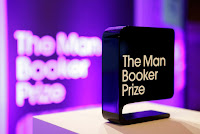I received an advanced
copy of this book from the publisher in exchange for an honest review. Here it
is:
Jesmyn Ward has
established herself as one of the more important American authors of her
generation. Having won the National Book Award for her debut novel, Salvage
The Bones (a book I loved), she followed it up with a memoir, Men We Reap,
and edited a collection of essays and poems, The Fire
This Time: A New Generation Speaks about Race, re-examining the questions
James Baldwin had asked fifty years prior about race in America. There is no
doubt that Ward has positioned herself as a profound commentator on issues of
race in twenty-first century America.
With this track
record, her second novel, Sing, Unburied, Sing, comes with very high expectations and for the most part Ward
meets them. A master of intertwining very intimate and personal experiences
with broader questions, Ward gives another gut wrenching story that tackles
issues of race, addiction, economic depravity and familial conflict and loss.
The story follows members
of a black Mississippi family coming to terms both with the approaching death
of the family matriarch (Mam), a drug addicted daughter (Leonie) and long dead
son (Given), as well as the struggles of adolescent grandchildren (Jojo and
Kayla) forced to come to terms with a painful family history and the consequences
everyone still lives with.
Delving into issues of
interracial relationships, racial tensions and violence, told through vivid and
atmospheric prose (almost poetic), Ward delves deep into the pain that burdens
the entire family as the passing of an elder forces them to address the
injustice of their past losses.
Ward is the kind of
writer who will always write a solid novel, so skillful and thoughtful when
dealing with profound themes, giving us characters exuding with empathy, even
when they are morally conflicted and damaged individuals. She is a master of
the intimate revelation, allowing readers to feel compassion for her subjects
but also deal with the broader thematic issues that cautiously lie just below
the surface of the story-telling.
While Sing, Buried,
Sing does all that, I did not find it quite as compelling as Salvage the Bones.
While her first book takes place in the immediate aftermath of Hurricane
Katrina in New Orleans, her newest book does not interact as obviously with
such an historic event. This doesn’t take away from the high-quality writing, just
maybe makes it a bit less powerful since the broadly known horrors of Katrina
are not there to add emotional depth to the book.
At times, the writing also
gets bogged down in its own attempts to sound beautiful, and I found this could
be distracting. I get annoyed sometimes when writers show off their craft too
obviously, and although Ward is certainly a master of hers it came off as too much
at times.
Ward’s choice to tell
the story from multiple perspectives also means that we lose some of the emotional
connection for the characters we would have had it been told from just a single
person. That said, Ward wants to reveal the complexity of a family unit coming
undone, and to limit perspective would likely undermine this. However, in a
book of such compact size (barely 300 pages) that comes with some drawbacks.
Nonetheless, Sing,
Buried, Sing will still rightfully find much praise. It is longlisted for this
year’s National Book Award and I have an inclination that it will be one of the
novels looked closely at by the Pulitzer folks.


